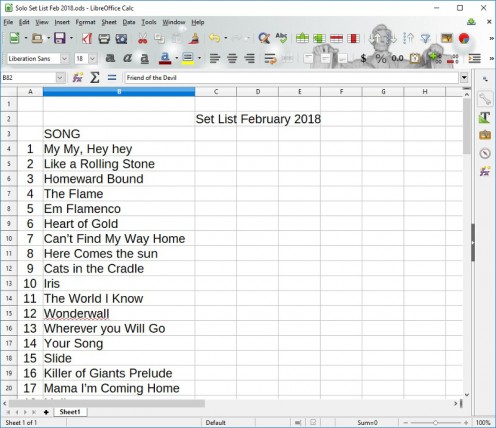Building Up a Set List Quickly for a Band

If you are starting a new band, one of your biggest challenges is building up a set list quickly. You want to be out there playing as soon as possible but that requires that your band has enough songs down in order to play anywhere from two to four hours worth of music. That’s a lot of songs. Much is dependent upon the genre you are playing but I have found that, generally, the average run time of a song is about 3 ½ minutes. So when estimating the amount of time I can fill, I generally use that number to make my basic estimates. For more accuracy later on, I may actually time myself when playing each set.
One thing that would obviously make the whole process easier would be for you to be in a situation where everyone in the band wants to basically do the same type of music. It not only makes for less conflicts when deciding what songs to do but it makes it more likely that everyone in the band would know the same songs and that would make it easier to build up that set list sooner.
Making a Preliminary List
The first thing you would want to do is make some sort of preliminary list. Each member of the band should say what groups and what songs from those groups they know. Write down all of the songs that each person knows from the groups you all like. Don’t worry if it is a very long list. This is really just a brainstorming exercise to come up with as many songs as you can. But at least try to list only songs everyone in the band would like to perform. That will make the list a little shorter but more precise.
Go down the preliminary list and put an asterisk next to all of the songs most of the members of the band actually know. For example, if three of the four members of the band know a certain song, put an asterisk or check mark next to it. Then you make a list just consisting of the songs you checked off. That will be your “to-learn” list. It’s like a to-do list but a list of songs you will all try to learn first.
The To-learn List
Now that you have that to-learn list put together, put the songs in order of what is known best. As an example, there may be a few songs that everyone in the band knows. Put those songs on the top of the list. Then take the songs that maybe three of the four band members know after that. Then you put down the songs that only a couple of the band members know. Now you have everything in order that shows what songs you should work on first. The ones you work on first are the ones most people in the band know and are on the top of the list.
Everyone in the band should get a copy of the list so that everyone is aware of what songs are to be learned first. You literally need to be all on the same page. You also have to decide how many songs you will want to learn by the next band rehearsal. Let’s just say that you want to learn the three songs on the top of the list. So everyone should be expected to actually know all three songs and be ready to play them by the next band rehearsal. Also make sure that everyone has a copy or access to all of the songs on the list. Make sure there are no excuses for anyone not learning the songs.
Goal Oriented Rehearsals
Each band rehearsal should be goal oriented. What I mean by that is that there should be a set goal for the band to meet prior to the rehearsal. The goal should be to learn specific songs by the next rehearsal. Everyone has to know what songs are to be worked on and everyone must know that it is their responsibility to learn their part prior to the rehearsal and to not waste the other band members' time by trying to learn their parts on the band’s time. The band’s rehearsal time should be used to practice the songs everyone should have learned.
Here is where you will often start to have issues. There may be one band member that did not learn what he was supposed to. That doesn’t just set him back but it sets the whole band back. This is not good. This also should not be tolerated. If you have these sort of problems early on, take my word for it, they usually don’t get any better over time. You see, some people are slackers. Some [people are wannabes. A wannabe is someone who wants to be something but doesn’t want to put the work in. A slacker is someone who may put the work in but not at a pace that is satisfactory. He may often try to get away with the minimum. Unfortunately, that still holds everyone else back too. So if your goal is to learn three specific songs by the next band rehearsal, that needs to be done by everyone with no exceptions.
My Set Lists Are Done as a Spreadsheet and Are Dated

Organization is Key
Everything goes smoother and everything goes faster when everything is organized. I know the difference between being organized and not being organized and I can tell you that the more organized you are as a band, the faster you will be out there playing paid gigs.
Part of the organizational process is deciding what order you will be learning the songs. The order should be prioritized by having the songs that are known best at the top of the list to be learned first. And even though you already have that to-learn list, you still need that long preliminary list to look at so you can keep in mind the long term goal of eventually learning all of the songs on the list. People can skip ahead and learn those songs in advance. The more of that that is done, the sooner those songs will be learned as well.
The Importance of Discipline
Learning what you are supposed to learn and strictly adhering to learning the songs on your various lists requires a certain amount of discipline. If you make that commitment of learning three specific songs, you need to have the discipline to follow through. You may find that some songs are harder to play than others and you may know some techniques better than others. So you just may have to work harder on the songs that don’t come easy to you. You might get two of the three songs down quickly with very little effort but there may be that one song you will have to play over and over until you get it down. That obviously requires discipline.
If You Can Do More, Then Do More
In all of the examples I have given so far, I basically used three songs as a basic goal. You could do more if you are able. However, whatever the amount of songs you want to learn by each rehearsal, it needs to be a number all have agreed upon. But, if everyone feels they may be able to learn four or five songs between each rehearsal instead of three, go for it. Eventually you will figure out what pace works best for everyone.
Also, if you could do more advance planning, then do that as well. Go over your various lists to try to determine what your long term song learning strategy should be. You need to analyze as to whether or not you are moving at a satisfactory pace or if you need to make any modifications to your long term goals or your lists of songs. But, in any case, if you feel you are all capable of doing more, do more.
The End Result
The end result of it all is determined by the various factors I have mentioned. Organization and a sense of direction keeps you on track. You set your various goals that you want met for each band rehearsal. Everyone needs to be disciplined and apply themselves to learning the same songs. And a series of lists will have to be made. As you learn the new songs, you have what is your completed song list. Those are the songs that you all know and have been playing. Those are the songs you all have down.
When you start each rehearsal, first play all of the songs that you have down first. Then play the new songs you are working on. Go straight down your lists. If you do all of these things without fail, the end result will be that you will be able to put that set list together quickly for your band.
© 2018 Bob Craypoe








